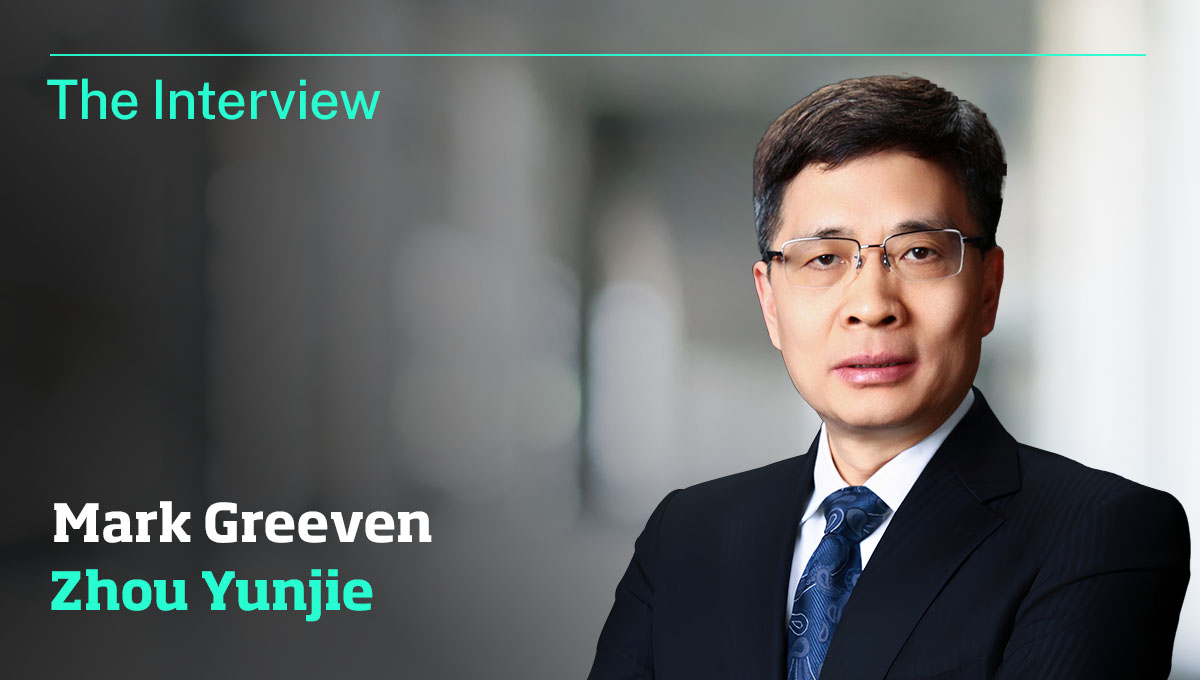The long road to capitalism: here’s why China has arrived

As business partnerships with China are on the up, it’s becoming imperative to crack the mystery of the “China code”. On the one hand and given how the country serves as a model for prosperity, China seems to be capitalist. On the other, it defies so many of the rules: no free elections and no free market economy, for example.
In this webinar – which appeared live on 9th July 2020 – Nico Luchsinger, Co-Executive Director of the Asia Society Switzerland moderated a session between Arturo Bris, IMD Professor of Finance and Head of the IMD World Competitiveness Center, and Mark Greeven, IMD Professor of Innovation and Strategy with a strong interest in China.
Drawing from the trio’s varied experience and opposing views on the topic, the audience was able to get under the surface of China’s political and economic setup. This is a crucial part of the exploration of the landscape, especially for companies working in China or working with Chinese companies that are branching out on the international stage.
“China is hugely important not just to the economy but to the world in general, so it does matter whether China is a capitalist country or not,” said Luchsinger. “The reality is not a simple yes or no.”
The event followed the Oxford style, with participants casting a pre-debate vote on the statement that China is capitalist country. Initially, 54% favored the statement, while 37% disagreed and 10% did not know.
Several key areas were highlighted during the course of the lively discussion: the definition of capitalism, the existence of profit-driven companies and a profit-driven state, the importance of private property, and the existence of laws that protect from abuse by the state, among them.
“Money, money, money!” exclaimed Professor Greeven arguing for the motion in his opening statement. “Chinese money may be red money but it’s still money.”
The professor, who has a decade of experience in China and has authored two books on its business ecosystem, suggested that the pursuit of profit made China a capitalist country. With private entrepreneurships responsible for 70% of China’s GDP and these companies receiving little to no help from the government, Professor Greeven posited that “It is not because of the government, but in spite of the government” that they have succeeded.
On the contrary, Professor Bris did not hesitate to call – in his opinion – a spade a spade: “Capitalism is to China what American football is to football, fat-free cheese is to cheese, or what the Democratic People’s Republic of Korea (North Korea) is to democracy.”
He reminded the audience that China’s own constitution says it is a socialist state and does not so much as mention the word capitalism. China’s economic success comes from softening rules of socialism, Professor Bris claimed, saying: “It shows failure of socialism, not the win of capitalism.”
Professor Bris used the example of the country’s financial sector to round out his arguments, with particular focus on the role of the state in the economy.
“Assets are controlled by the state, as well as land and natural resources, so China is therefore a socialist country,” said Professor Bris. “Shanghai has the fourth largest stock exchange in world, but it is owned by the state,” he noted.
“China – with its diversity of people and cultures – is impossible to control,” said Professor Greeven, in a final appeal not to overestimate the Chinese state. “There is no monolithic centralized organization; China is a de-facto federalist state with great power at the local level.”
Concluded Professor Bris: “At the end of the day, this is not simply a semantic debate. We may think their system works, but it has not made China a successful country…yet. We need profound political change and economic reforms.”
So is China capitalist or communist? With an increase in 19% for his position on the original motion, the crowd showed support for Professor Bris, who noted that labels matter. Whichever side you take, these are capitalism and communism with Chinese characteristics.
This is an episode in the new series “Cracking the China Code”.
To attend Professor Mark Greeven’s upcoming China event, please visit:
www.imd.org/nexus/Cracking-the-China-code-2020/
Research Information & Knowledge Hub for additional information on IMD publications

Geopolitical turmoil and its workforce impact demand a systems thinking approach from CHROs, argue IMD’s Katharina Lange and Simon Evenett.

China’s apparel sector in 2025 sees local brands rise and global players adapt amid digital, Research & Development, and innovation-led growth.

Explore how innovation, R&D, and policy reforms are reshaping China’s pharmaceutical sector amid rising healthcare demand and demographic shifts.
IMD produces a yearly Smart City Index offering a balanced focus on economic and technological aspects of smart cities on the one hand, and “humane dimensions” of smart cities (quality of life, environment, and inclusiveness) on the other. In this...
It's a reversal of the situation: Chinese automaker BYD is offering to collaborate with former electric car pioneer Tesla. From drones to livestream trading to artificial intelligence: China is often ahead of the West.

Haier's CEO Zhou Yunjie explains how the company's innovative RenDanHeYi model empowers employees, drives global growth, and adapts to market changes.

China's self-reliance, innovation & resilience under 'Made in China 2025' continue to shape its global role amid geopolitical tensions & policy challenges.

Your gut instinct matters in a data-driven world. IMD’s Heather Cairns-Lee & Eugene Sadler-Smith explain how intuition enhances decision-making in uncertainty.
The case explores TBC Bank Group’s remarkable journey from a small Georgian bank to a regional leader in digital financial services across Central Asia. Founded in 1992 with just US$500 in initial capital, TBC evolved into Georgia’s largest financ...
The Trump administration’s recent tariff threats have increased uncertainty over the business model of Temu and other large ecommerce groups. The White House reversed its initial closure in 2025 of a loophole that allowed low-value parcels shipped...
Research Information & Knowledge Hub for additional information on IMD publications
Research Information & Knowledge Hub for additional information on IMD publications
Research Information & Knowledge Hub for additional information on IMD publications
IMD World Competitiveness Center Report, 8 April 2025
Research Information & Knowledge Hub for additional information on IMD publications
Research Information & Knowledge Hub for additional information on IMD publications
Research Information & Knowledge Hub for additional information on IMD publications
Research Information & Knowledge Hub for additional information on IMD publications
Research Information & Knowledge Hub for additional information on IMD publications
Research Information & Knowledge Hub for additional information on IMD publications
Research Information & Knowledge Hub for additional information on IMD publications


